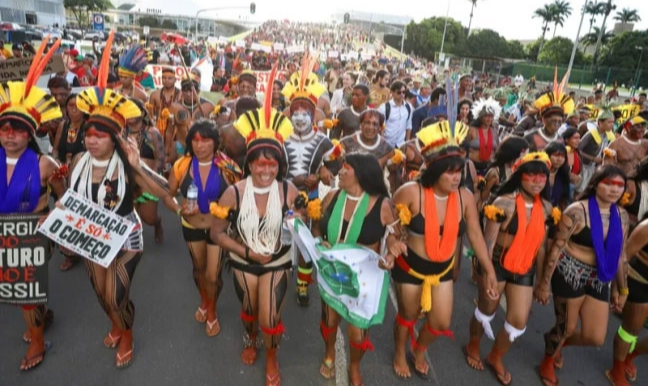
By María Josefina Arce
Representatives of indigenous communities from Latin America arrived in Brasilia, the capital of Brazil, as part of the annual event known as Campamento Tierra Libre, the largest mobilization of the indigenous peoples of the South American giant that has turned 20 years old.
The event, which concluded this weekend, was a space to coordinate actions to address the problems that these communities still face today, with whom the world has a historical debt, after centuries of violence and marginalization.
The participants, who defended their right to land, gathered at the Esplanade of the Ministries, where the headquarters of the three powers are located, executive, legislative and judicial.
In this edition, climate change also occupied an important place in the exchange of criteria, to which they are highly vulnerable given their close relationship with the land and its resources on which they depend for their livelihood
But their well-being is in danger, due to actions derived from human development, particularly industrialization and the use of fossil fuels, to which is added the occupation of their lands and the contamination of waters by activities such as illegal mining.
Hence, the climate emergency was declared in 2023, in the 19th meeting, which has once again gained prominence with the return to the presidency of Brazil of Luiz Inácio Lula da Silva, who has resumed the policy of demarcating indigenous lands. an old demand.
He also created the unprecedented Ministry of Indigenous Peoples and the National Foundation of Indigenous Peoples is gaining strength, destroyed during the government of today's former president Jair Bolsonaro, who encouraged the invasion of the lands of these communities.
Lula da Silva participated in the closing of the 2023 event and on this occasion received a representation of the participants. The Brazilian president has emphasized that the indigenous issue is a state matter.
These communities demand, among their demands, greater participation in decision-making on climate change, an aspect that should be taken into account due to their rich knowledge about the environment.
At the twenty-second session of the United Nations Permanent Forum on Indigenous Issues, held last year, the UN Secretary General, António Guterres, emphasized that the so-called "green economy" is not a new concept for indigenous peoples, from which, he stressed, we have a lot to learn.
In these two decades, the Tierra Libre Camp has been an opportunity to make art and ancestral indigenous wisdom visible, while it has also become a space for the articulation of the tireless struggle of these ethnic groups for their rights.
There have been more than five centuries of resistance and struggle by indigenous people, who paradoxically defend and protect the environment for the common good and yet pay the highest price of the climate crisis.

